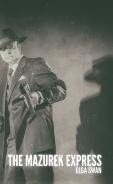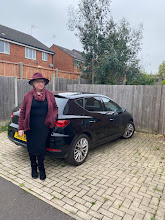The September edition of the excellent Connexion newspaper included a double-feature on how to get a novel published here in France. It's clear that an important point for all authors is to write about what you know and to work out your target audience. What is different about your novel and why would people buy it? My latest novel, Vichyssoise (amzn.to/2bg3kkG), now available in paperback, springs to mind because it was researched from original French texts and set in areas and streets near to where I lived. I would hope, therefore, that it appeals to all English readers, but particularly those interested in WW2 and/or those who know the areas of France covered therein. Here's a taster, covering St Antonin Noble Val in Tarn et Garonne. Hope you enjoy it.
"... Back in her own lodgings on the top floor of an old house in the Rue de la Treille, just off the Place du Bessarel, Karin thought long and hard about what to do next. She had secured the flat by using some of her precious francs from her coat lining. She managed to set up her improvised radio on the table in the kitchen, and told her landlady that she was a journalist and didn’t wish to be disturbed. “Don’t worry about the cleaning,” she told her. “I prefer to do my own.” In her secret broadcast back to London that night, she reported that from her observations, the mood of the country seemed to be that of being neither active in the Resistance nor acting as active collaborators. Most appeared to have adopted a wait-and-see stance – something they called attentisme – and were concentrating what energy they had in holding on and getting through the dark days of les années noires. Their priority was survival. Because of the loss of the men, the burden of everyday life fell on the shoulders of the women. It was they who formed the lengthy queues outside shops, and they who washed what clothes their families possessed with what cleaning materials were available. That night proved clear and free from mist rising from the Aveyron, so Karin carefully locked her room and ran downstairs to the Rue de la Treille. She crossed over the Place du Bessarel, greeting the old women with her customary “Bonne soirée” before turning the corner and walking up to the café. Whilst she was standing at the counter waiting to order her coffee, a stranger walked in. He had a newspaper under his arm and wore a soft felt fedora on his head. He walked up to the counter and ordered a café crème. “Non plus,” said the bartender, wiping the counter clean of coffee stains. “D’accord,” said the stranger, and went to leave. But not before turning to Karin and, in a surprising gesture rather like Général de Gaulle himself, taking her hand and brushing the skin on the back with his thin dry lips. Before she could utter a word, the man lifted his head and looked at her, his eyes glittering a warning not to say anything. She understood. He left, closing the café door quietly behind him, the tinkling of the bell the only indication of his having been there.
"It would have been forgotten, except for the scrap of paper he had surreptitiously left in the palm of her hand. She carefully stowed it away in her coat pocket for later, carrying her coffee over to her usual table by the door. She finished her coffee and got up to leave, wishing the bartender “Bonne nuit” before walking slowly but purposefully back to her flat. Once safely there and with the door locked, she sat down on the bed and took the paper from her pocket. 'Imperative we know date when Germans take over unoccupied zone. Take whatever means to find out, and report back soonest. Gwendoline.' "
18th September 2016
Subscribe to:
Post Comments (Atom)


















No comments:
Post a Comment